Women at the Top of the World
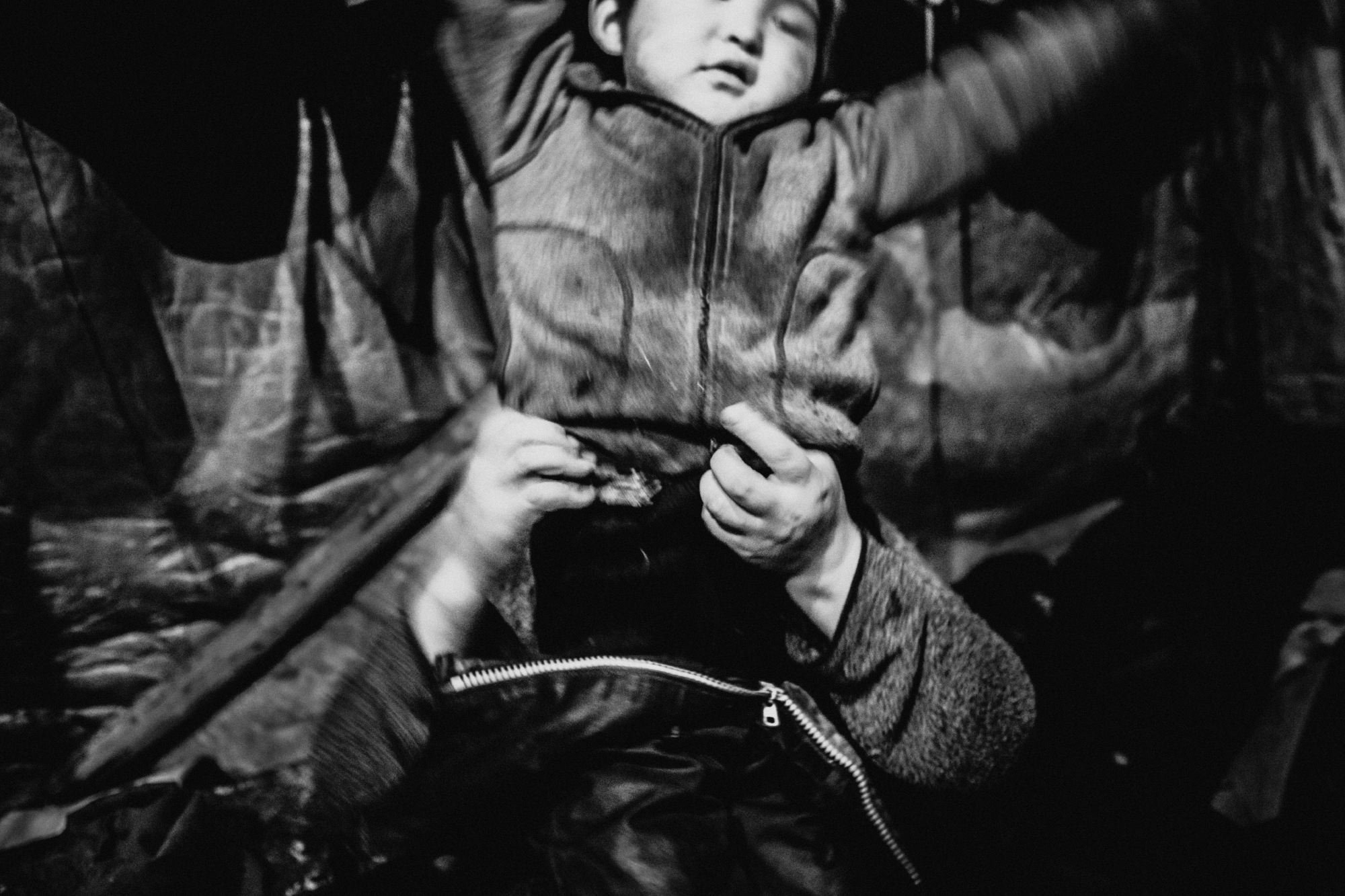
What women dream about in the tundra
In 2017 a new occupation appeared on Russia’s official list of professions: chumwife. A chumwife is the wife of a reindeer herder, a.k.a. “the mistress of the chum,” who takes care of the children and the family’s everyday needs.
In reality, of course, there have always been chumwives. In the Soviet era, sovkhozes (state collective farms) simply designated women as grade three reindeer herders, and their wages, when they were lucky enough to get them, were miniscule. But starting in January 2018, when chumwives became “official,” they received a boost in pay and a new inscription in their labor books: grade three chumwife. The governor of the Yamal-Nenets Autonomous Okrug (YNAO), Dmitry Kobylkin, proudly announced that the region had “fought and struggled” for acceptance of this important profession.
Recently, Lidia Okotetto, head of the Yedey Il reindeer herding community, declared on the floor of the YNAO legislative assembly that the salaries of chumwives needed to be raised. Okotetto, an honored citizen of Yamal, is herself a former chumwife. “Reindeer herders receive very little,” she said, “and chumwives get kopeks. In the tundra, a man is nobody without a wife, and these wives have few joys trying to make a livable home, following their husbands around with six children in tow.”
Okotetto is 73 years old and lives in Salekhard. She recently had a heart attack and gets around with the help of a cane. But, as she puts it, it is her duty to tell people “on the mainland” about the lives of chumwives.
“Our people have been put out of work,” Okotetto says. “Chumwives and reindeer herders have been tossed out on the street. There are few reindeer left, and few jobs as well. But for women, what can they do except become chumwives? Before, there were sewing workshops in the sovkhozes – they sewed burkas and unts. Those have been closed. Panayevsk used to be the richest sovkhoz in Yamal. They had their own cows, their own cream, their own milk. The fur farm was shuttered as well. Now the entire village is unemployed.”
Okotetto convinces me that, in order to write about the lives of women in Yamal, I need to see everything first hand, and that I should travel to Panayevsk, on the left bank of the Ob River. The reindeer herders there are readying to migrate, but many have not yet packed up their chums.
The Edge of the World
The only way to get to Panayevsk is on a huge, all-terrain vehicle called a Trekol. Twice a week a helicopter makes the journey, but it is expensive, and getting a ticket is not easy. The Trekol driver names his price: 4,000 rubles. “In four hours you will be in Panayevsk.” Nearly all the passengers are villagers returning home from the city with their purchases. Things are very expensive in the remote settlements, and everyone who can comes to Salekhard to shop.
Instead of the promised four hours, we travel nine. At night, I can’t see a thing, but from the crackling beneath the wheels I can tell we are driving on ice. The driver is spooked after hearing that a car has fallen through the ice somewhere nearby, which is why we are driving so slowly. In our headlights, we see that a Trekol like ours has lost a wheel. The driver informs us that people don’t abandon their own in the tundra, so he stops and goes out into the night to help. An hour later I succeed in falling asleep amid the boxes. When I open my eyes, we are still not abandoning our own. Finally, the wheel is back on, and at two in the morning I find myself walking around Panayevsk in search of a hotel.
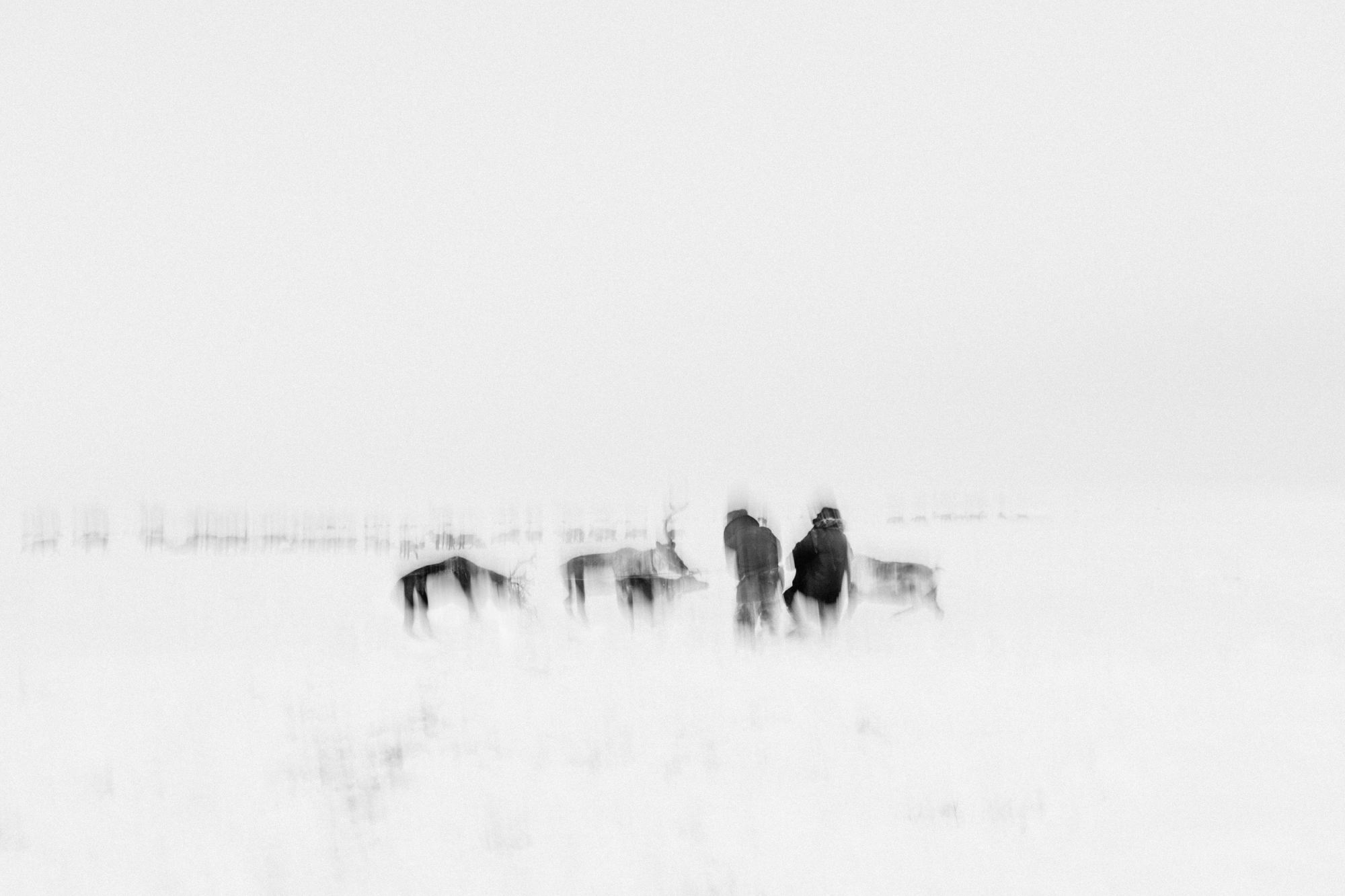
Panayevsk is not large, but it is full of life. The residents are mainly Nenets and Khanty. There are dogs sleeping on many of the sleds – made of wood and animal hides – perched outside the entrances to the two-story brick buildings. At one of several stores I hand over 740 rubles for the smallest available bottle of a nondescript cognac, noodles, and some crab sticks (the food choices are minimal). There is a school, a kindergarten, and a clinic. Nothing unusual, except that people are walking around in beautifully embroidered yagushkas and malitsas, their faces covered. And just an arm’s length away is the endless tundra, with its dim, icy, rose-colored sun.
Practically all the reindeer herders who live in Panayevsk work in the local livestock sovkhoz. There are seven reindeer herding brigades, each with four to six herders, depending on how large the reindeer population is in a given year. These days the ratio is about 300 reindeer per herder, which is a lot.
Early December is a busy time for the herders – they are preparing to migrate out onto the tundra, to their wintering location, where they will remain until spring. They stock up on food and gasoline, and get their shots and checkups at the local clinic.
Liver With Blood
I catch Robert and Zoya, herders in brigade number four, as they are exiting a store. Wearing a puffy hat and an embroidered yagushka with a white collar, Zoya looks like a princess out of a winter fairy tale. The couple is heading off to their chum tomorrow for three days and agree to take me along.
This evening they are staying with Robert’s parents, the reindeer herder Yefrem Klimov and his chumwife Yekaterina. They are retired, but they still go into the tundra in the spring and summer, and rest at home during the winter. Zoya and Robert toss their outer layers of clothing on the floor near the entrance – a habit from chum-living.
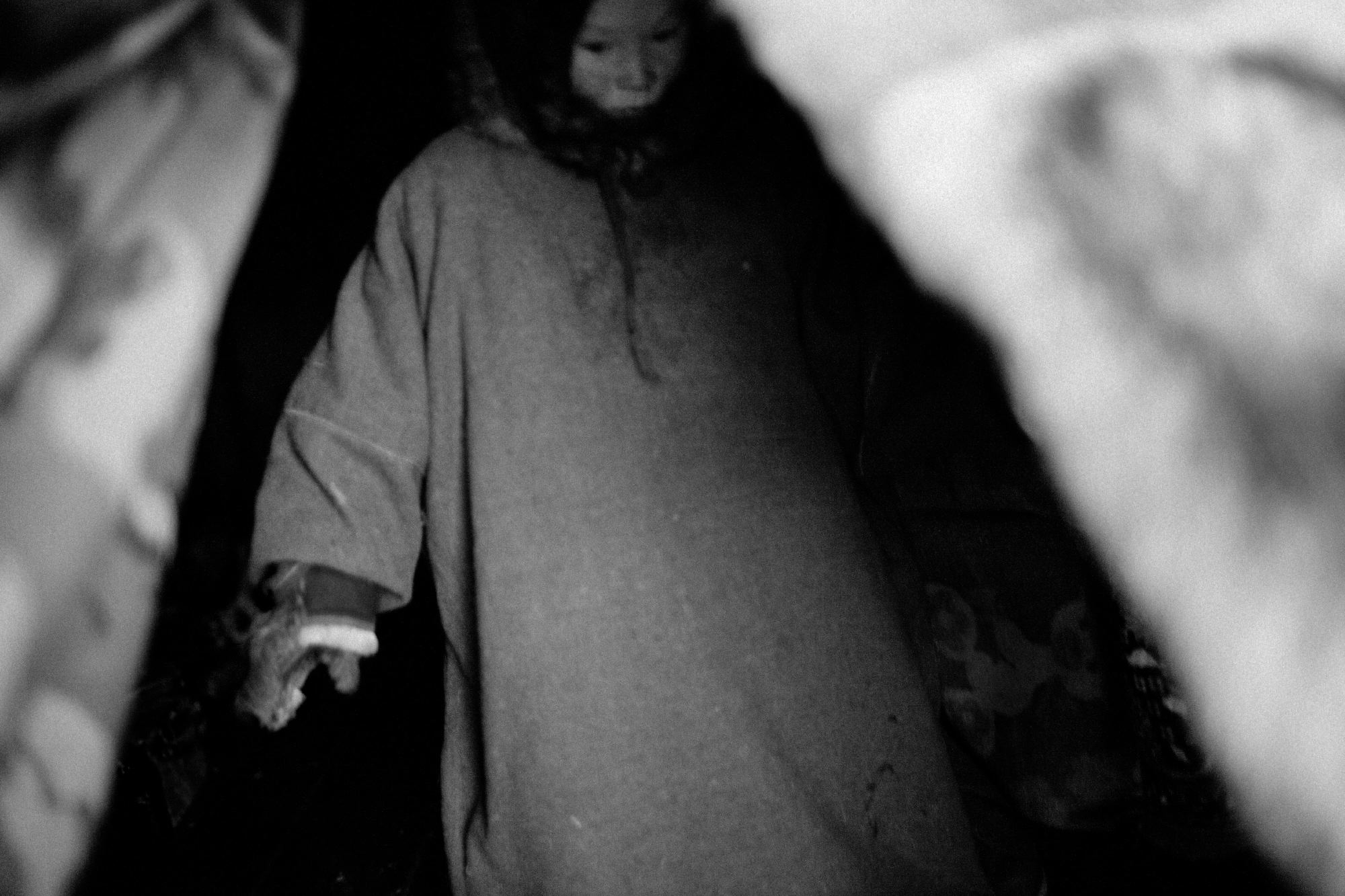
Yekaterina was born in the tundra. In her time, just as now, no one gave birth in hospitals. From the age of ten she helped her mother out around the home: fetching water and wood, tidying up. When she married Yefrem, her duties changed little: the same work in the chum, only twice as much, since she was now an adult.
Then, as now, the chumwife’s responsibilities include keeping the chum warm and orderly, educating the children, and sewing clothing for the whole family. Women get up around six and go to bed near to midnight, when their husbands head out for night duty in the tundra.
“Today, it’s easier for the young,” Yekaterina says. “There are snowmobiles, chainsaws, generators. At night, a lamp burns and a television glows in the chum. But in my time we didn’t have any of that. My husband and I took opposite ends of the saw and sawed the wood. And then we had to chop it up too.”
Zoya sits on the floor in a brilliant, long dress, her hair tucked beneath a shawl (as is expected when one is with one’s elders), playing with her eighteen-month-old son Maxim. He stomps around the room in soft leather chizhiks that Zoya sewed for him. When chizhiks are worn outside they are covered with kisy made of deer fur. This is the singular shoe of tundra dwellers, and they are very warm. Maxim has been to the tundra before and tomorrow will be going there again. Children here get accustomed to the cold and the work from an early age. This is very apparent in the fact that everyone here seems warm except for me.
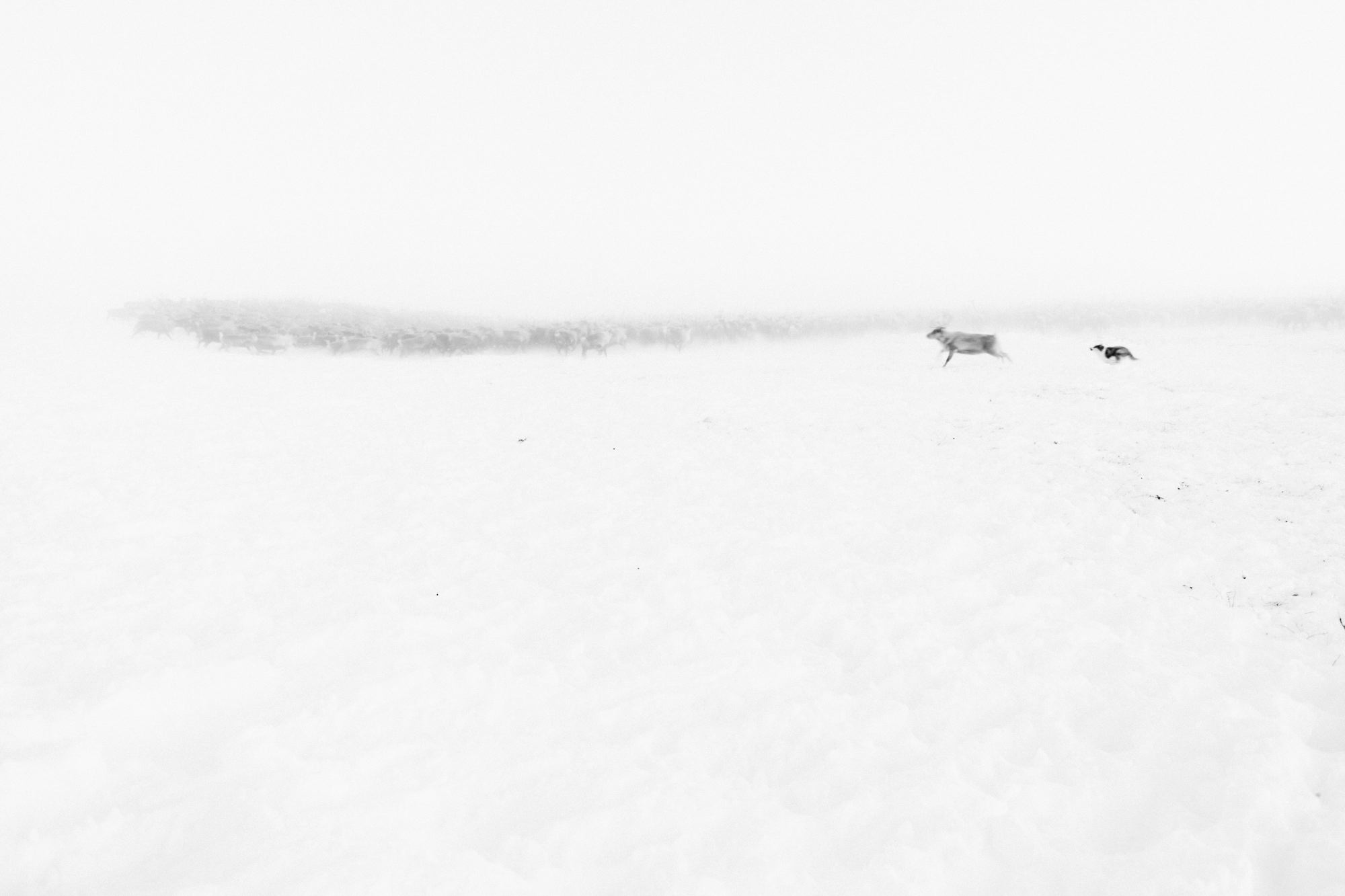
Before heading out to the chum, we have to eat. They invite me to their table, where the whole family has gathered. On the table is raw reindeer meat, raw liver sliced into pieces, and a deep bowl of blood. The herders dunk the liver into the blood, then in salt, and then heartily chew it. Bleeding meat is cut from the bone with a large knife.
“Sit! Why are you standing?” Zoya asks. “Everything is fresh!”
In the entryway I have a backpack with cookies in it, so I politely refuse.
Surviving at Minus 40
“Why ever did you come in the winter, and not the summer?” Zoya asks when we are suffering through an icy nighttime ride on the snowmobile.
To be more exact, it is her husband Robert who is suffering. We are flopping around on the sled with the children.
“I wanted,” I yell at her through my ice-hardened muffler, “to write about the most difficult part of your life.”
But what I’m thinking is that I am an idiot and that I will definitely die here. I am bundled up in three pairs of pants, all my sweaters, a warm jacket, and a winter coat with a hood trimmed in deer fur. Yet I am still frozen through by the wind. Concerned, Zoya places her hand, encased in a deerskin mitten, upon my knee. Through the narrow gap between my brow and nose I see snow, darkness, and endless stars. It is a cold, painful beauty. My upper and lower eyelids freeze together; there is no way to separate them, as I must grip the sled with both hands. After an hour, we arrive at the chum. Inside, the temperature is -40˚, the same as outside, and we are joined by five frost-covered tundra dogs.
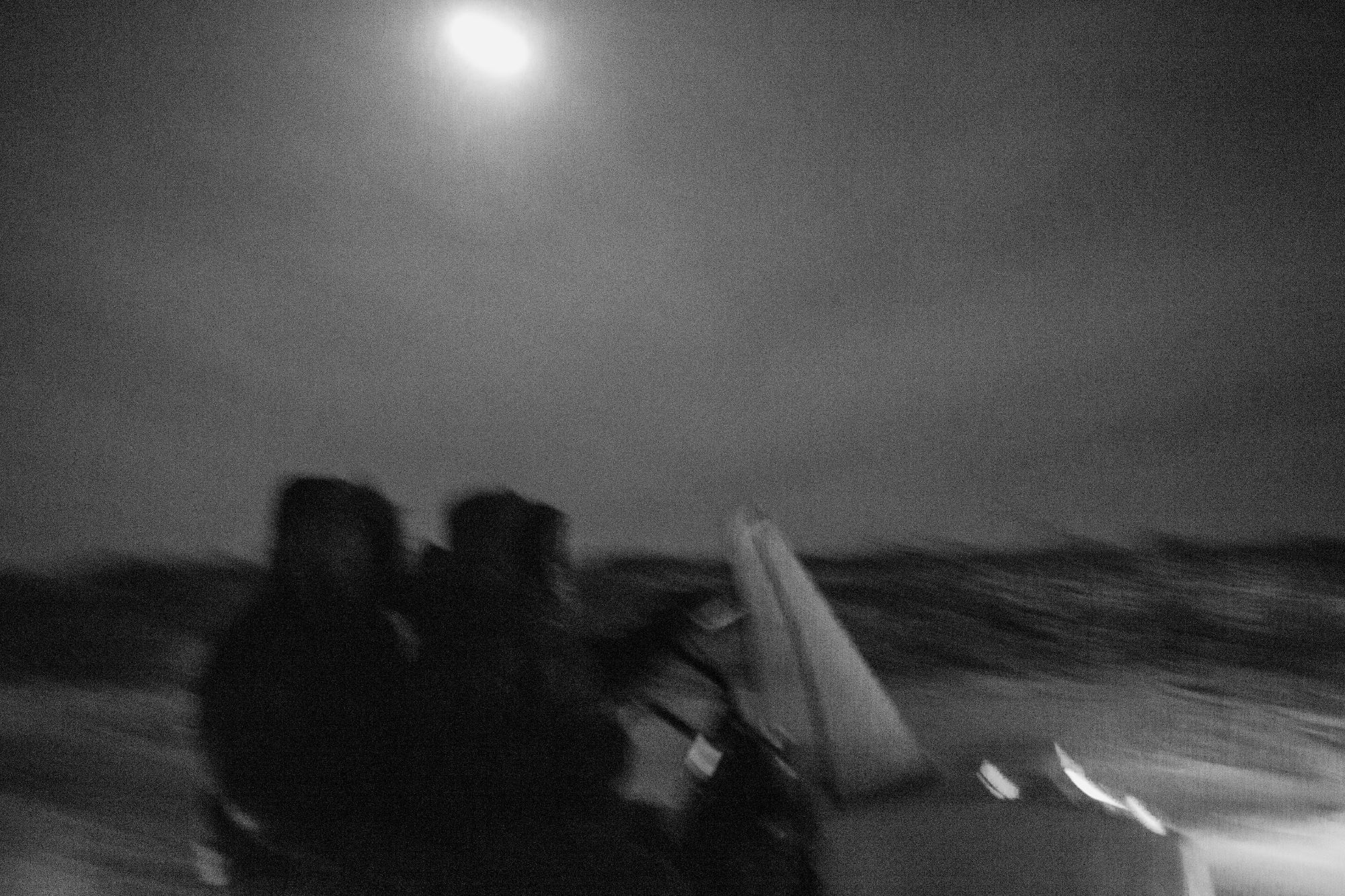
Zoya removes her yagushka and with her bare hands throws some frozen wood into the stove, the pipe from which goes up to the “ceiling” and out of the chum. She tears off the bark, cutting her fingers in the process. I stand at the stove, unable to move.
“You’ll warm up soon,” she laughs.
Half an hour later I warily remove all but one sweater and two pairs of pants. Inside the chum it smells of wood, deer, thawed dogs and surviving people. The dogs lie on the floor about the stove; I brazenly wedge myself in between them.
The chum is about the size of a small, one-room apartment. Thick poles, hung with reindeer skins, intersect at the top. On the floor are rough-hewn boards, thick and wide. The space is divided into two parts: left and right. The left side belongs to Robert’s parents; sleeping there is not permitted, it is like a second room. The right side belongs to the younger generation. I can sleep alongside them. Zoya recalls how, in her childhood, a single chum was divided among four families. Each had their own corner, cordoned off by curtains. So, by comparison, they have far more room now.
At the back of the chum is the “holy place,” where there are no planks on the floor, but there is sand. There stand the cook pots and containers with water. A woman should not step across this space; it is a bad omen – the reindeer might become ill.
Nearly all tundra superstitions have to do with something bad happening to the reindeer, because the herd is the most valuable thing the tundra herder has. Healthy reindeer mean a happy and well-fed herder. You protect them before you protect yourself, and they are denied nothing. In the spring, their antlers are trimmed off – the young, soft ones that contain many useful substances. A kilogram of antler goes for about R2000, while reindeer meat costs R190-210 per kilo. (Last fall, Robert earned about R50,000 from the meat of 14 deer.) Of course, they only sell off their own, private deer. The sovkhoz’s meat is taken away by the sovkhoz. The skins are used to make clothing, shoes, floor coverings, and the chum covers. Meat is eaten or exchanged for fish.
Once the chum had completely heated up, Zoya moved a table from the corner, poured some tea, and sliced some frozen fish. I had brought out my shabby cognac and crab sticks – Zoya, Robert and Maxim had never tried them before. The sticks and cognac paired quite nicely with the cold.
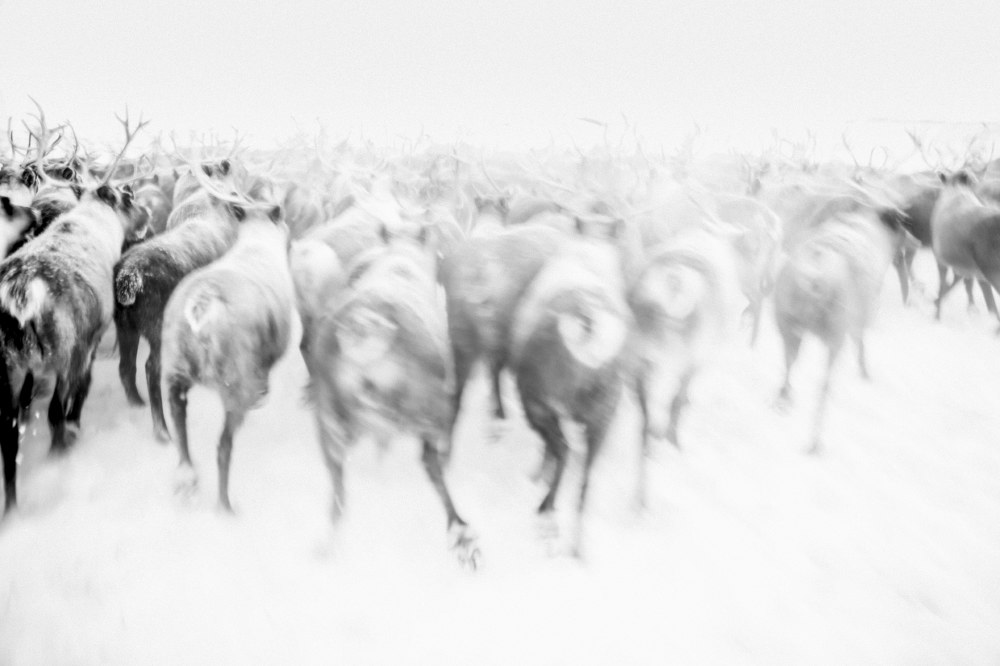
After dinner, Zoya cleared the table and got the bed ready. In the center of the chum, toward the stove, the pillows we had been lounging on were unfolded. This exposed reindeer hides – the “mattress.” The family sleeps tightly up against one another, removing their outer shoes (kisy) yet keeping on their chizhiks. They use their outer clothing – their yagushkas and malitsas – as blankets. I lie down near the exit, wearing my coat and chizhiks. Zoya covers me up with a rug and a warm cotton blanket.
I fall asleep as the stove is heating up. But at three in the morning I am woken by the unbearable cold. The chum has cooled down, and it feels like we are lying outdoors. I need to pee something awful, but it seems mad to even consider getting out from under the blankets and venturing out into the bitter cold. I hold it, suffering, until dawn and then creep outside. And I am petrified: slowly, like an apparition appearing out of the pink-blue sky, reindeer are closing in on me from all sides.
This is because, Zoya explains later, reindeer love the saltiness of urine. And they come to the camp in the morning in order to lap it up. What is more, some of them don’t stand on ceremony and try to directly interfere in the process, in which case you need to defend yourself with a stick. Some, like the white beauty Padvy, expect a bit of bread. In Robert’s herd there are several deer that he himself raised.
“I’d never have the heart to harm them” he says of these deer. “Let them live out their lives.”
When Padvy’s mother died, Robert brought the fawn into the chum and fed him, brought him deer moss, and even made him soup. Padvy got used to being around people and fell in love with bread – his white, frost-covered nose searches my hands long and hard for the object of his affection. Not finding anything, he turns his back and loses all interest in me.
“There are fewer and fewer reindeer; they are dying,” Robert explains before driving them away from the chum and toward their pasturing place. “The changing climate is destroying them. Spring arrives late, and in winter sometimes everything thaws and then refreezes hard. The deer eat deer-moss and cannot get to it when the snow turns into ice. They are starving, weakening. For a long time we have hardly harnessed any of them up, and that’s sad. We drive the herd with snowmobiles and dogs. As a result, my entire salary, all 20,000 and change, gets spent on gas.”
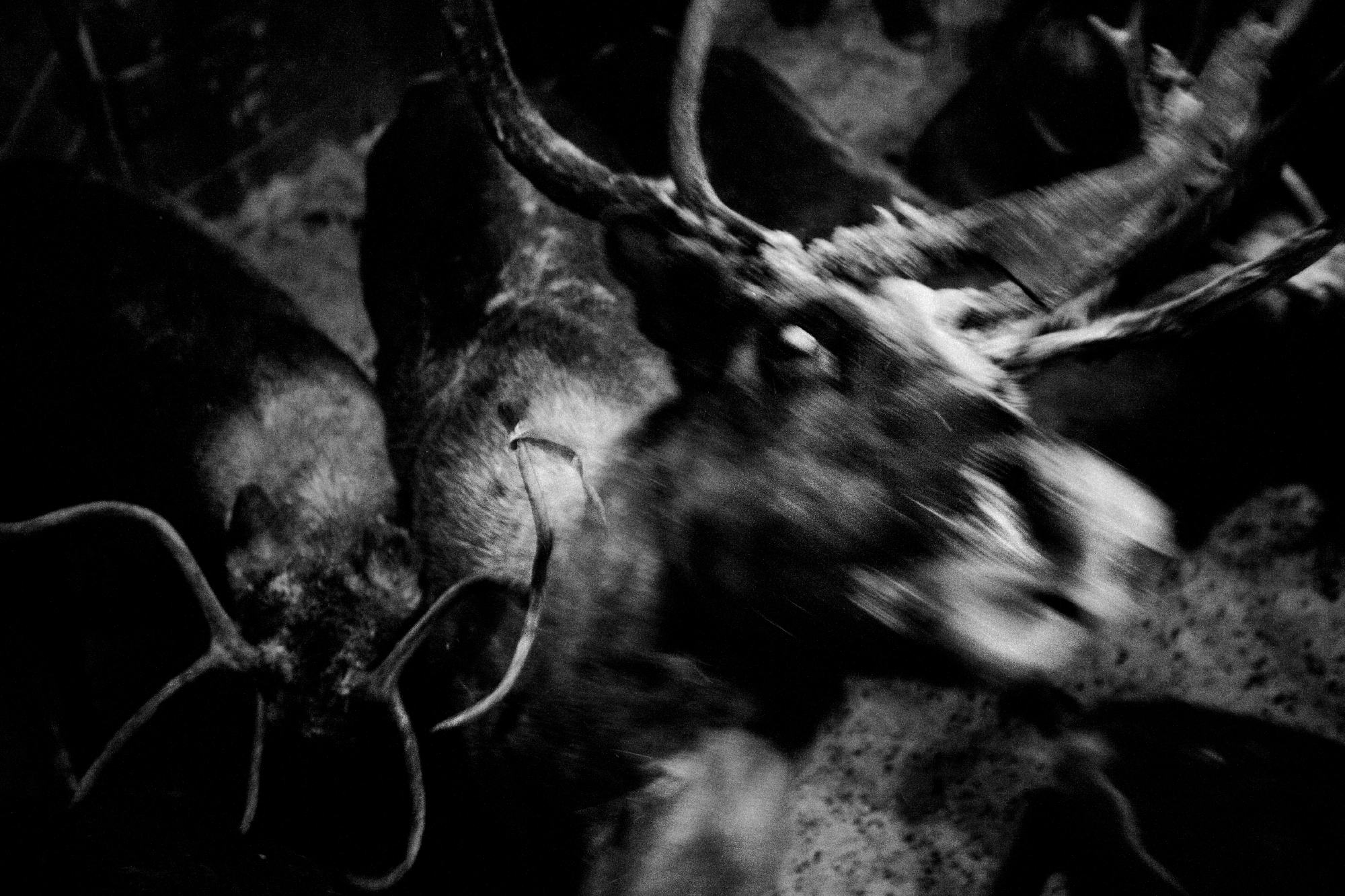
Robert can talk endlessly about reindeer. They are not merely food and a means of survival, but also his friends. He knows each one personally (his herd consists of 300 sovkhoz reindeer plus his private herd), by their antlers, ears, and faces. And he has no idea what happens to them at the slaughterhouse. He says that he drives the deer to the slaughterhouse and immediately leaves. Later he simply receives money for them.
“In my village,” Zoya interjects into the conversation, “they chopped the deer’s heads off. Yes! My mama saw it herself.” Robert grimaces and exits the chum, after stuffing several pieces of bread into his pocket.
Love in the Tundra
Zoya and Robert met on the internet. In her profile picture, Zoya was wearing a beautiful yagushka, and Robert could not resist. For three months they talked endlessly over the phone, then they met on Reindeer Day (Zoya is from another region). When he saw Zoya in person, Robert fell head over heels. He returned to Panayevsk, sat his parents on a sled and, without explaining where they were headed, rushed off to propose.
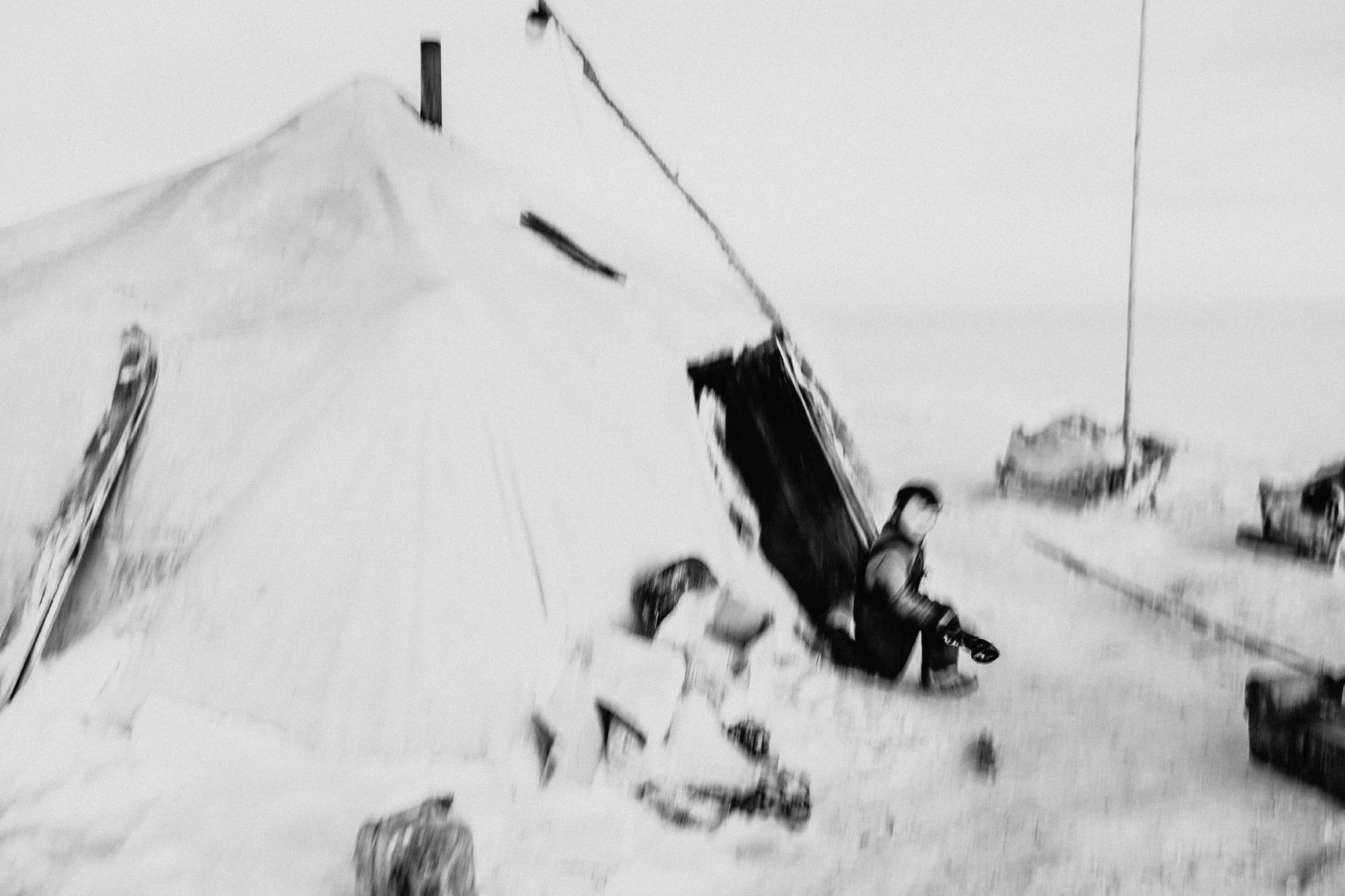
Like many, Zoya was born in a chum, but then lived in a village with her grandmother until she was 15, attending school. When she was in the eighth grade, her mother rolled in from the tundra and took her back with her – she needed someone to help out in the chum. Zoya never saw the inside of a school again.
The marriage took place in two chums: Zoya’s and Roberts. They registered it in Panayevsk. According to Zoya, Robert gave her flowers he had picked from the tundra and even helped out around the chum when he had time. Nonetheless, at first she cried, homesick for her family. Later, she adjusted to things and the crying stopped.
The entirety of the chum rests on Zoya’s shoulders. When we wake up early in the morning, her first job is to heat up the stove (I, meanwhile, shiver beneath my blanket and cannot move because of the cold). Then, filling the teapot with ice and snow, she puts it on the stove and goes outside to chop wood. They have a chainsaw, which makes the job much easier. When the logs are cut up, Zoya takes an axe and splits the wood. She ferries it to the chum in a sled, stacking the pieces neatly next to the stove. Every time she exits and enters, an icy, almost visible gust of air rushes into the chum.
There is no breakfast. After drinking some tea with cookies and bread, Robert heads out with the dogs and reindeer. And Zoya gets to work on lunch, cooking up some kasha with deer meat. She feeds it to Maxim, then she plays with him. Then she goes for water – through the snowdrifts and across three hills.
After she returns, we hear the hum of a snowmobile motor. “Oh, Robert has arrived,” she says, long since having learned to distinguish the sound of his Buran’s motor from that of others. After lunch the dishes must be washed. And then it is time to rest – by sewing. Zoya sews kisy, varezhki, malitsas, and yagushkas. In short, the same things as other chumwives. They also prepare the deer hides for sewing.
“Robert and I basically never argue,” Zoya says. “There’s nothing to fight about. All days are the same; our duties are well defined. And even if you did fight, it’s not like you can flee the chum. Where are you going to go? So we live in peace.”
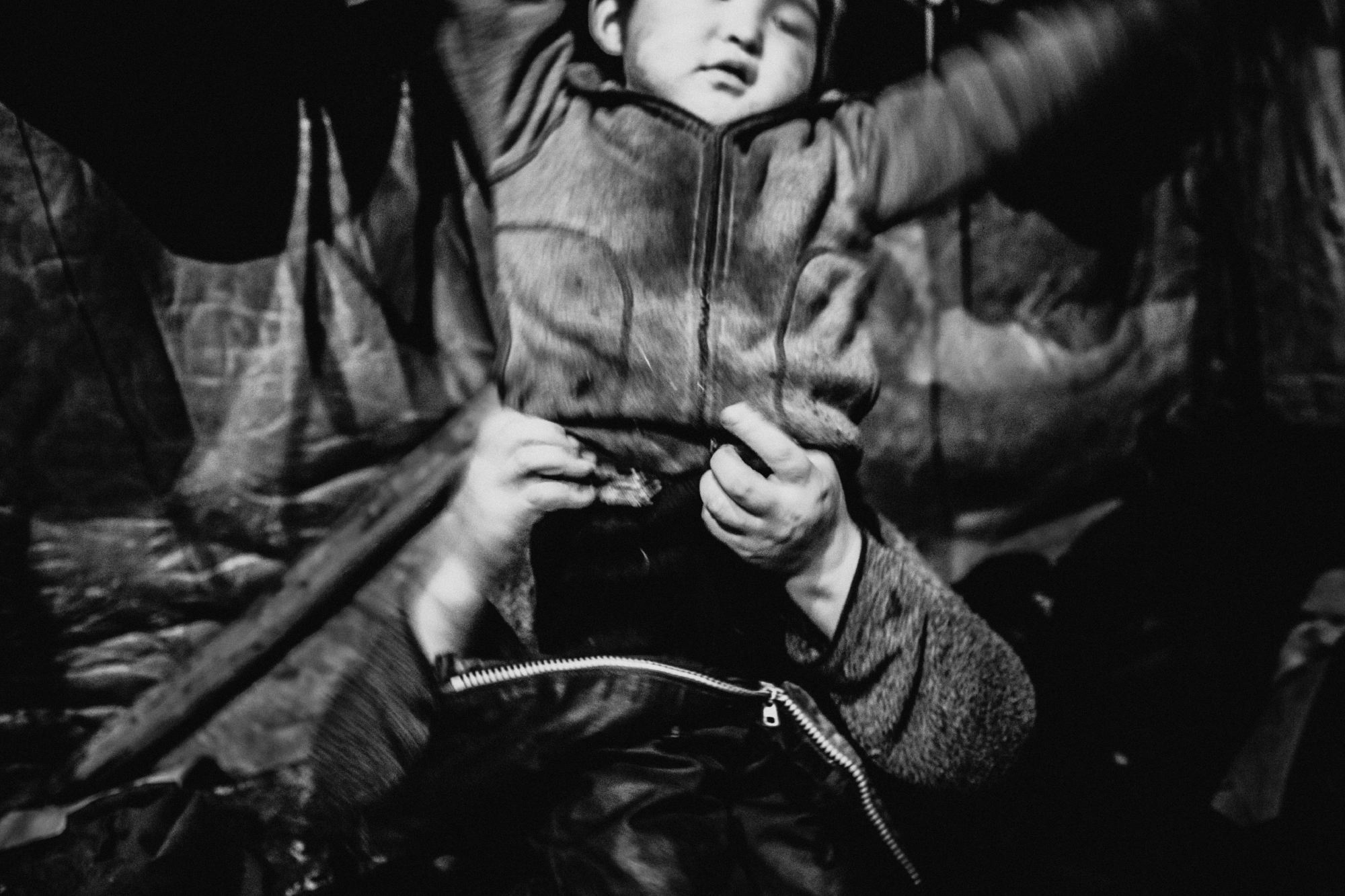
The most difficult thing, Zoya says, is breaking down and rebuilding the chum. Once, she broke it down when she was eight months pregnant. And immediately after that left to give birth.
In the migration period (soon they will have to travel 200 kilometers to the forest), the chum might be broken down and rebuilt seven times. It stands in one place for maybe two days, then the brigade moves on.
No Man Can Survive Without a Woman
Having finally warmed up at the stove, I step outside and peek into the neighboring chum, out the top of which curls a bluish-grey smoke. Two sisters – Liza and Yana – are settling in for some tea. Liza graduated from high school and started training to be a feldsher (a village doctor), but did not finish. As with Zoya, Liza’s mother hauled her off to help out in the chum; it was not open for discussion. But Yana was able to get her degree and become a chum feldsher. She served the brigade on call until she was laid off. Yana is married, and her children play all about her. And even though she was officially working as a feldsher, she managed to fulfill her chumwife duties as well. Liza also has a husband and three children.
The women suggest we sit closer to the fire. And they immediately reveal that they are no longer chumwives. They told me that they only received the higher salaries in their capacity as “official” chumwives a few times. Then they were sent on leave and told that later they should resign for personal reasons.
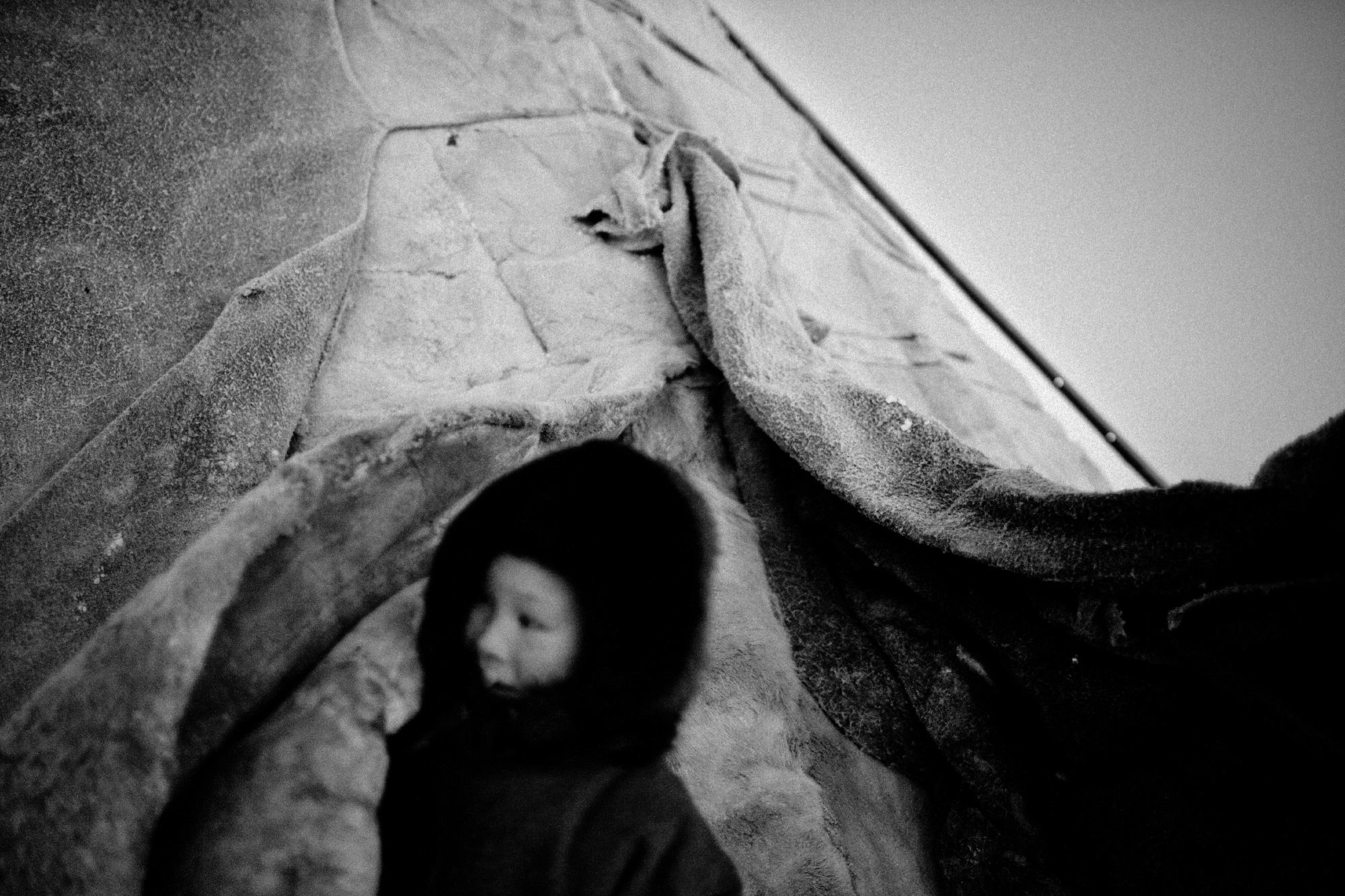
“Before, we received five to seven thousand rubles,” Yana explains. “But in January the pay went up to 18-20. And now they are asking us to resign. Apparently the sovkhoz is poor, there are few reindeer, and they don’t need so many chumwives.”
“But how are we supposed to live?” Liza asks. “All of my husband’s salary is spent on gas. They herd the deer on snowmobiles, and we have to drive to the village for food – no one brings it to us in the tundra. We are the poor. For real…”
After a short silence, Liza adds, “When they fire me, I’ll still stay with my husband and help him. They – the directors of the sovkhoz – know this, which is why they can so calmly revoke our salaries. A man cannot survive in the tundra without a woman. A woman is water, wood, warm clothing. We just went for water, and barely were able to haul the wood and water back here. We have to cut down trees in the forest, haul them, cut them up, chop them into firewood, and bring them home. Why can’t women, investing their whole lives in the tundra, be paid a normal wage?”
I can’t answer this question, and we transition to female questions, after sending the men out into the cold.
I ask what they dream about, and also about cosmetics. How do they look after their hygiene? How does a man choose his wife? How, when it comes down to it, do they relax? Surely they can’t do this all day every day!
“I don’t have any cosmetics,” Liza says with embarrassment. “I have scissors and I have hand lotion. Our skin dries out from the cold, gets chapped, and ages. I try to rub in lotion, because my hands give my age away.”
“I have scissors and lotion too,” Yana chimes in. “That’s all. You, on the ‘mainland,’ attract your men with cosmetics. But here we are chosen for our skill. Whose yagushka is sewn better, whose dress is more interesting, whose house is in order. And there are still the parents to look after, no matter if the bride is rich or not. We have practically no divorces in the tundra. People in the villages get up to all sorts of things out of boredom, but we work and live our whole lives in a strong family, with one person.”
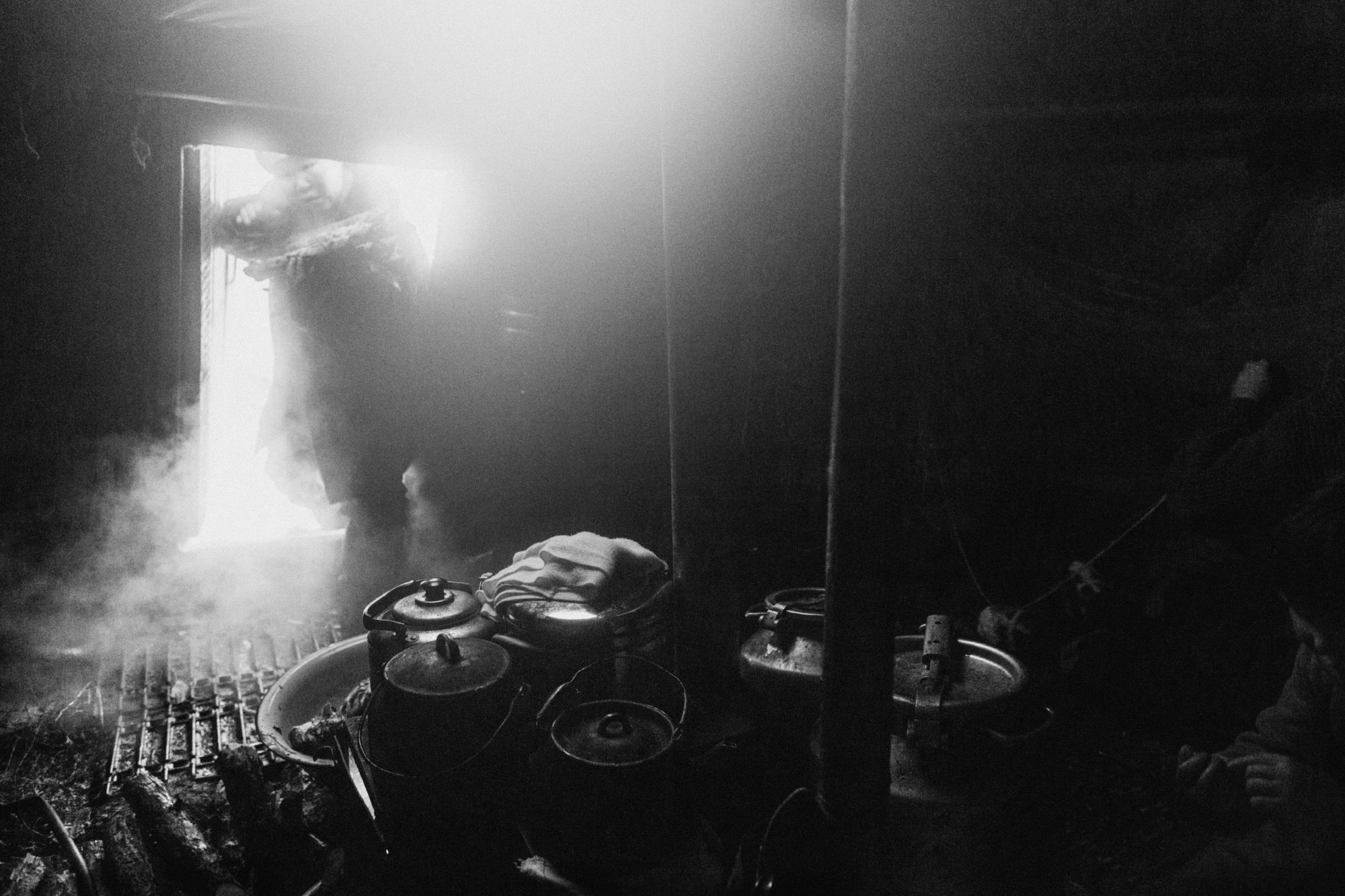
According to the women, each person deals with hygiene issues in their own way. Some wash once a week, others once a month.
“You melt some snow, warm it, then put a basin in the corner, and ask your husband to leave… And you wash. Nothing unusual,” says Yana. “Before, they would boil up chaga (a potion derived from mushrooms) and conduct a ceremonial cleaning during their period. Some Khanty woman preserve the custom to this day, where during their period they go outside, undress completely from the waist down, taking off their kisy, and vatniks. Lay out pine branches underfoot and wash with a chaga brew. I remember how, when I was young, mama (she is a Khant and papa is a Nenets) made sure I never let this cleansing custom slide. It’s cold, but what are you going to do? If you don’t observe the customs, it will be bad for the deer.”
“I dream that they won’t fire us,” Yana says in response to the next question. “I want to live until my retirement, to obtain my proper rank. Several women are even willing to work without pay, if only they can get a full pension. We’re not wild animals. How are we supposed to live on our pensions, when the time comes?”
For a long time, Liza can’t answer the question about her dreams. But then she says, “There is nothing to dream about. Dreams don’t come true, you know… Sometimes I sit in the corner, when my husband is not around, and cry until I am worn out. But this is what it’s like here: tired or not, you must still work. If you cry, it sort of makes it easier. And you go on living.”
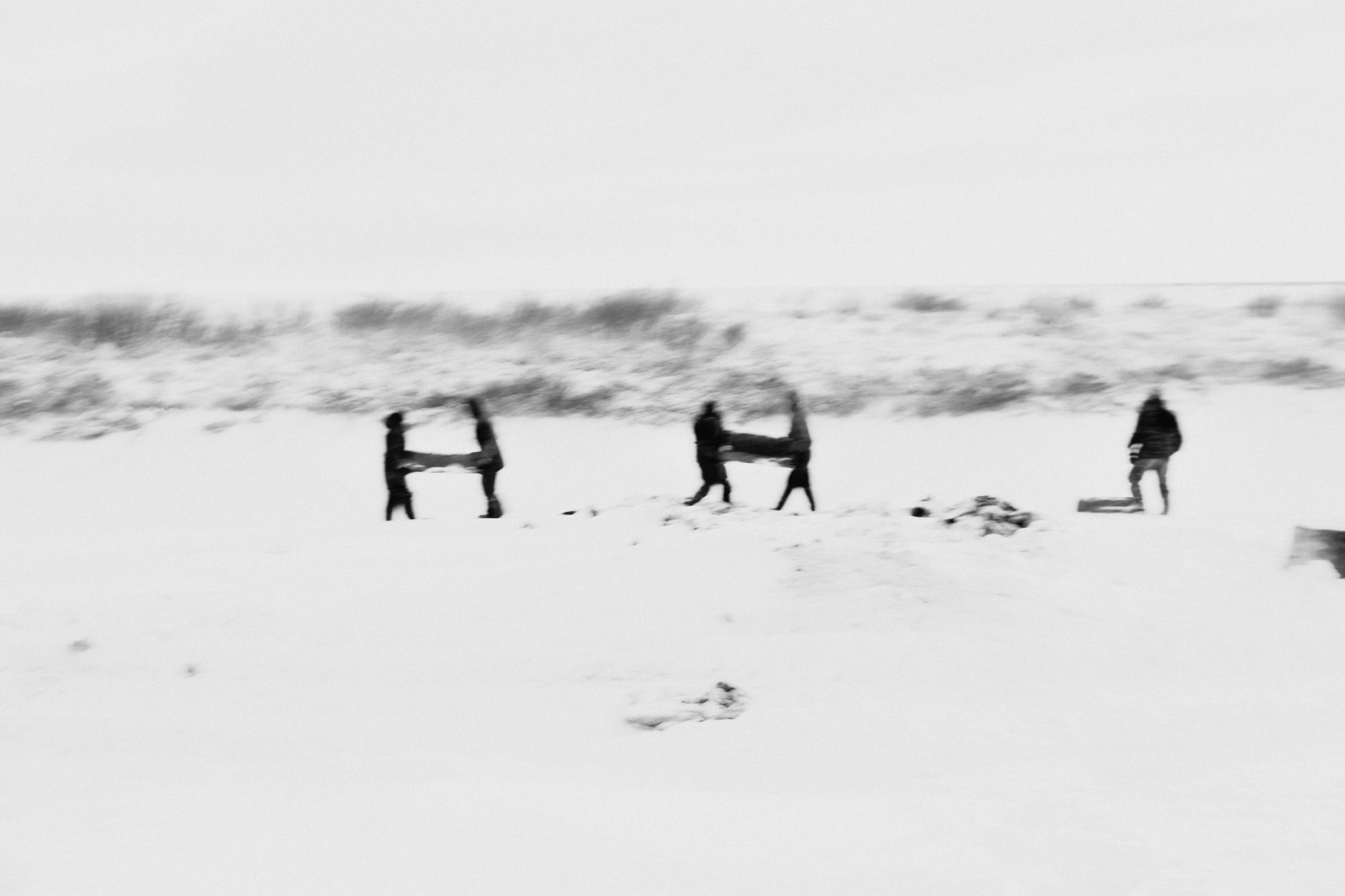
Both Liza and Yana say that the time they spend sewing is their leisure time. To sew something beautiful, with a pattern – that is rest.
It is also enjoyable when they get to take a bath in the village. What happiness! You arrive, swollen from the cold, and you relax. But, they say, it gets boring after two or three days resting in the village and you want to return to the chum.
There are craftswomen who live and work in the village, sewing yagushkas, malitsas and other things for sale. But the tundra-dwellers say that it is simpler to sew these things for themselves than to buy them. “You buy kisy in the store, and there goes your whole monthly salary. And a fine yagushka can cost R100,000.”
Yana, Liza and Zoya all have several yagushkas. “You can’t always wear the same one!” A few for dressing up and going out and about, a few for work.
I get a sense of the magic powers of the chumwives’ clothing when Zoya lends me her dress yagushka so that my teeth will stop chattering and I’ll stop whimpering from the cold. It has a white collar and a hood of white fox fur. She also gives me newly sewn kisy. All I have to do is step out of the chum and the reindeer herders all turn and look in my direction. One cries out, “What a beauty! I would give 100 reindeer for you!”
I don’t need 100 reindeer, but I am warmer now. But that is thanks to the reindeer fur, not emotions. The Nenets’ heavy national dress truly protects you from the cold. And I am revived.
By the time we reach the topic of sex, the men have started returning to the chum. The women fall silent and snicker, but the men answer my questions.
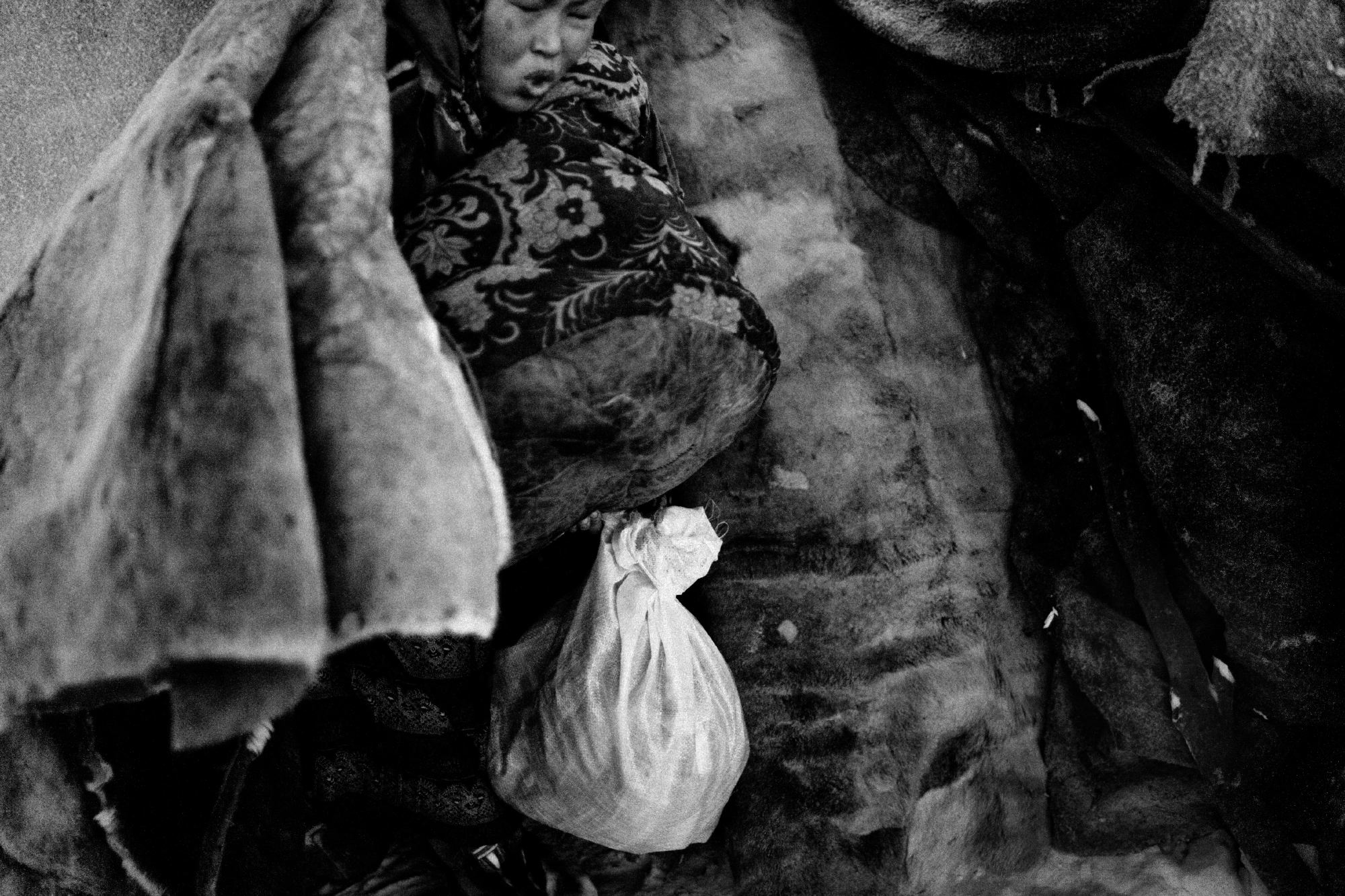
“What do you mean, ‘how’?” Andrei mimics me. “Quietly, on our sides.”
“We close the curtains. So, there is sex in the tundra. And sometimes newlyweds are left alone, which makes it easy,” Yana says, smiling.
As a former feldsher, she explains how chumwives try to take care of their health themselves, as much as possible, in the chum. Because you can’t go off and leave your husband alone.
“Tonsillitis, upper respiratory tract infections, food poisoning – we treat these ourselves. Only in extreme cases do we agree to go to a hospital; they medevac us in a helicopter. If the situation can be endured, for example someone breaks a bone, then a helicopter won’t come. They will wait until a certain quantity of sick adults accumulates. A broken bone, for example, is nothing urgent. One fellow broke his clavicle, and I treated him as best I could, and then the break healed itself wrong. You need a surgeon for that! He waited a week for medevac, and then they broke it again and operated.”
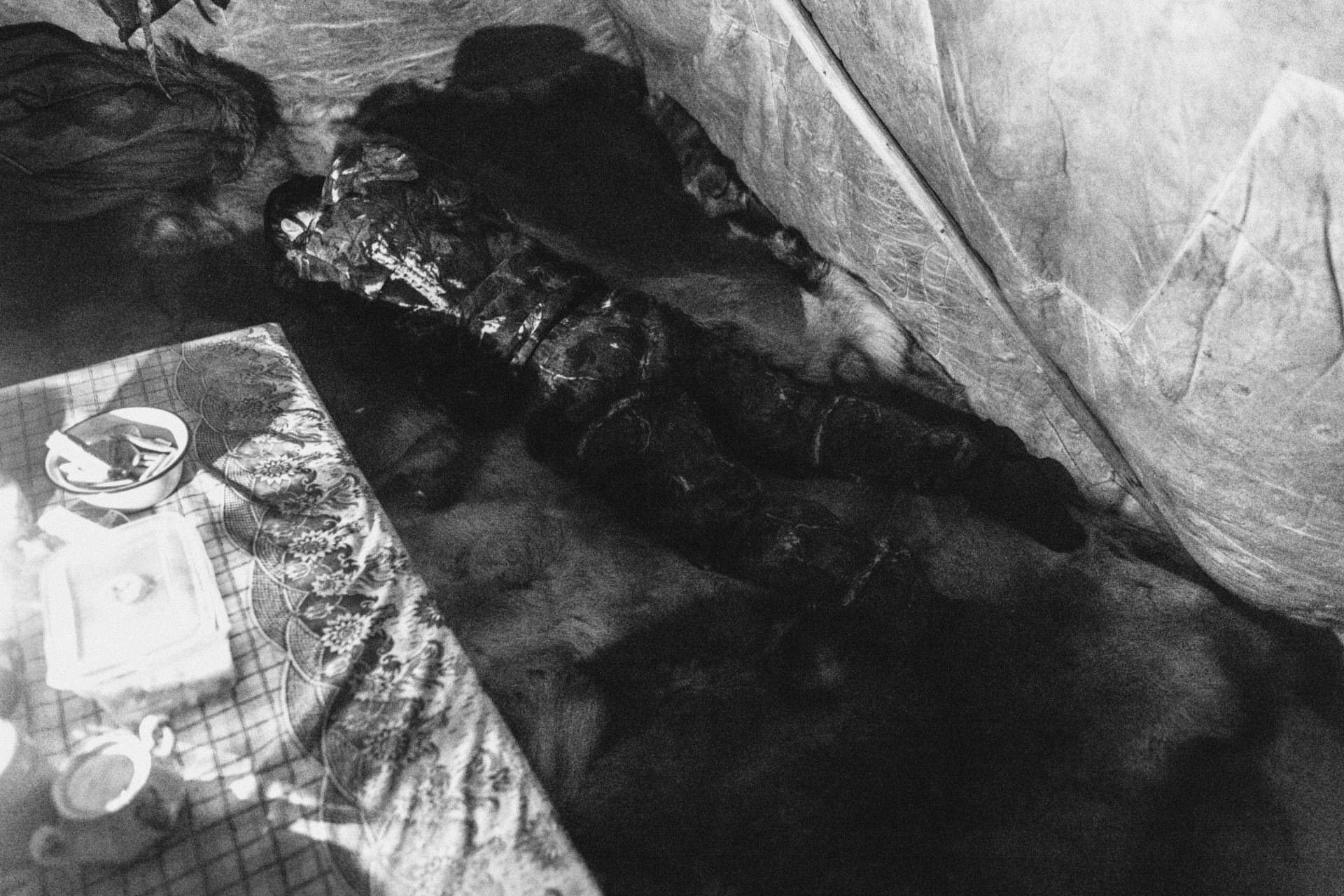
“The office takes no responsibility for you,” Zoya says, continuing on the medical theme after I squeezed back into the chum (I never was able to pull off a grand entrance, sweeping the heavy curtain aside) and related my conversation with Yana and Liza. “In the spring we sign a document that says, if something happens, the sovkhoz bears no responsibility. If the deer trampled me, or if I cut off my hand with an axe, whatever, I myself am to blame, even though it should be called a work accident, no? I did not sign that paper, and then found out that someone had signed my name for me.”
Important Little Things
In the evening Robert goes on duty out in the tundra. All night long he will watch to make sure that the reindeer don’t wander off somewhere. He will sit in sleds, ride around on the snowmobile. Alone in the tundra at night, without a roof over his head, without a fire.
“How?” is the only question I can put to him. “How do you not freeze to death at night out there?”
“Well, it’s not your ordinary warm clothing I’m sewing for him,” Zoya laughs. “I don’t worry about him. He leaves, I do what I have to, and then lie down to sleep. In the morning he always returns.”
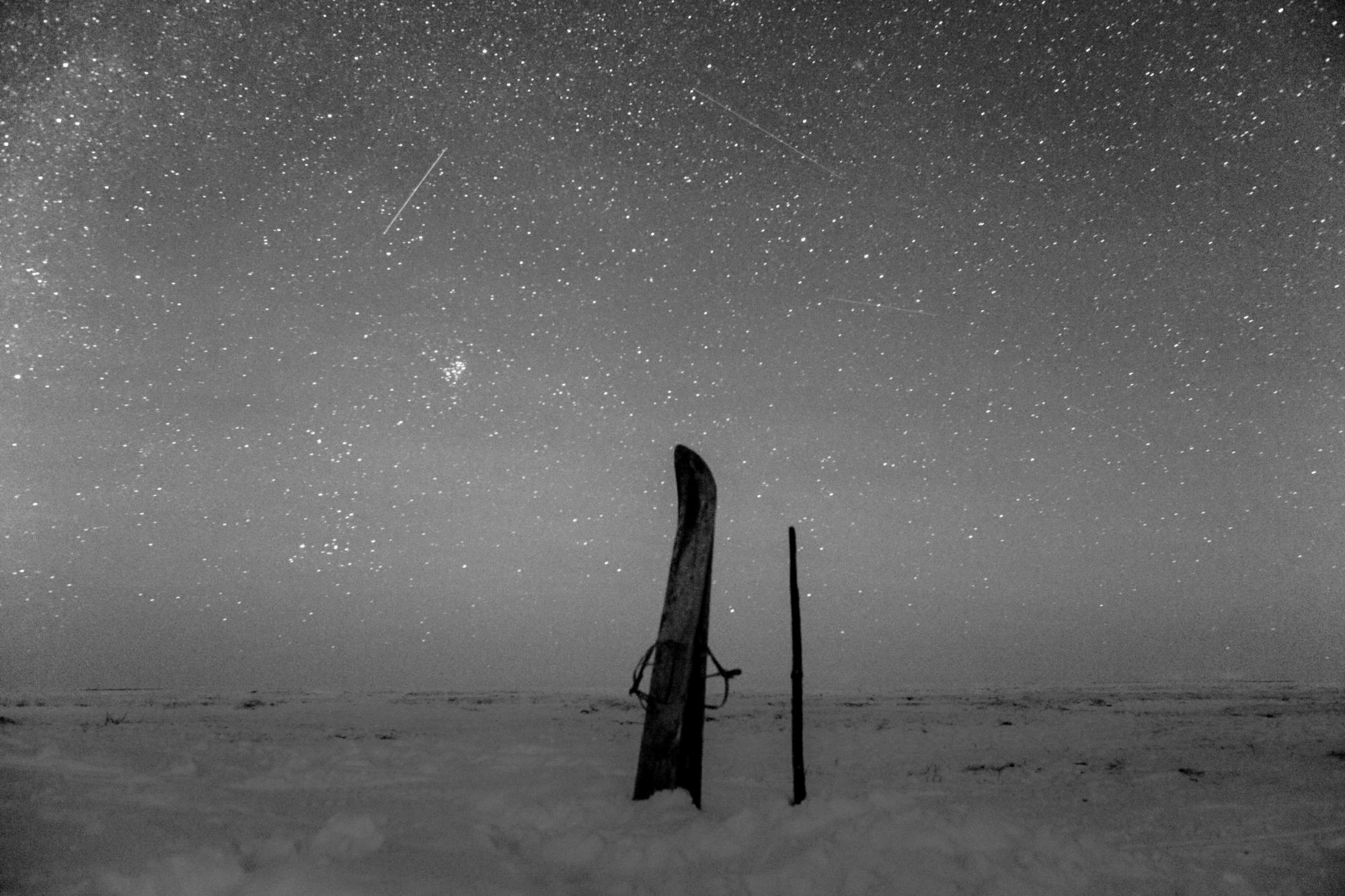
The second night in the chum I sleep according to the rules. All the chumwives graciously advise me to wrap myself up in the yagushka and then cover myself with every available blanket. And don’t take off my kisy. Zoya carefully tucks the heavy edge of a fur coat under my side, so that I don’t feel a draft. That night I sleep better and only get a little bit cold toward morning. But my contact lenses freeze in their container, as do the moistened toilet wipes I brought. Wiser now about the deer and their tastes, I carry a stick with me out into the dark pink morning. The animals are already all here, waiting off to the side, watching me with their sad eyes.
There is both delight and pain when observing the reindeer. Many are bleeding from their antlers, their ribs protrude, their legs are so thin, that it seems like, if they stumble, they may break. Robert worries a great deal about his herd. This year he did not slaughter a single one of them: “There are so few, why murder them as well?” But next year some will need to be slaughtered, or else there will be nothing to live on. “I feel like ours is the last generation of reindeer herders,” Robert says sadly. “After us, that’s it. No one will be left.”
A bit later, when I go with the chumwives to fetch water down the hill past the trees, I notice blood underfoot (there was none the day before). Intestines are carefully arranged on the hoarfrost-coated bushes, like Christmas garlands. As I slept, a life was quietly ended.
Robert arrives red and blue from the cold and says nothing. He sits by the stove and drinks tea. Then he goes out for wood (sometimes he helps his wife). After the reindeer herder has thawed out, I ask about the intestines in the bushes.
“They killed a weak doe,” he answered. “She was pregnant. Weak. Dying. They killed her so she wouldn’t suffer. And they hung the fetus and all the rest, so that the dogs wouldn’t eat it. It’s a bad omen if they are eaten by dogs. The deer could get sick. For the same reason we hang their heads up high, so that no one can get to them. Just the birds.”
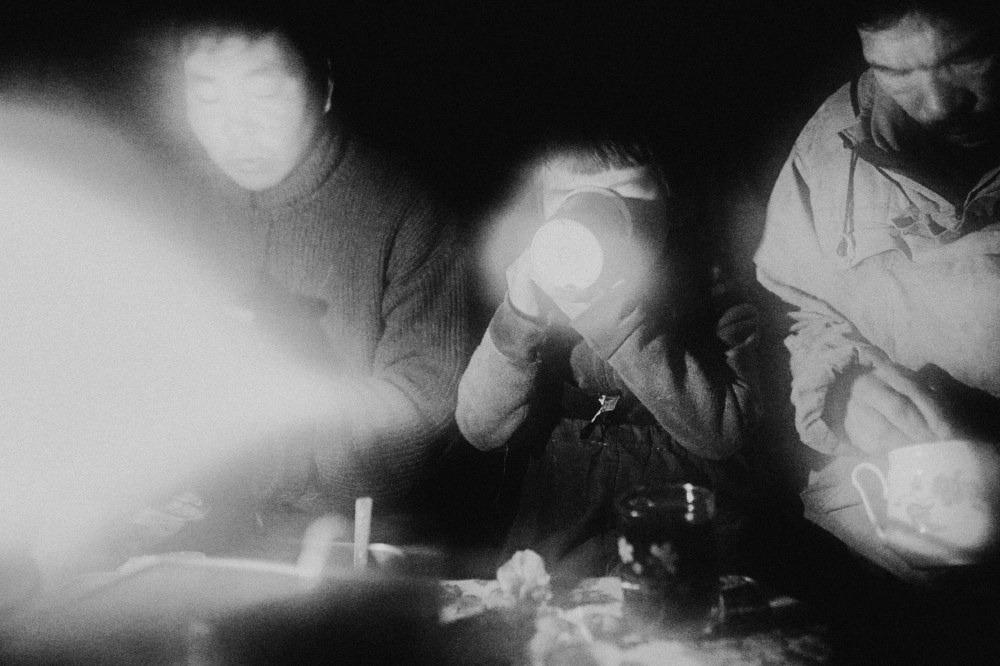
When Robert again leaves to drive the herd to their feeding, I ask Zoya the same questions that I asked the others. Her answers surprise me with their humility, pessimism, and, at the same time, the unvarnished understanding of her existence she displays.
“I got married, so no dreams remain. I don’t even remember if I ever had any dreams… When mother took me out of school and to the chum, I immediately understood that I would have no other life. So what is the point of dreaming? I endure more than I dream. I worry that, like the others, they will now let me go. How would we live then?”
Zoya explains that since January she has been receiving 22-23,000 rubles a month. And this money would go away.
“What do you spend your salary on?” I ask Zoya.
“On food, and I give it to my husband for gas.”
“And do you buy yourself anything?”
“Of course! Soap, detergent, baby food for my child.”
“And cosmetics, makeup perhaps?”
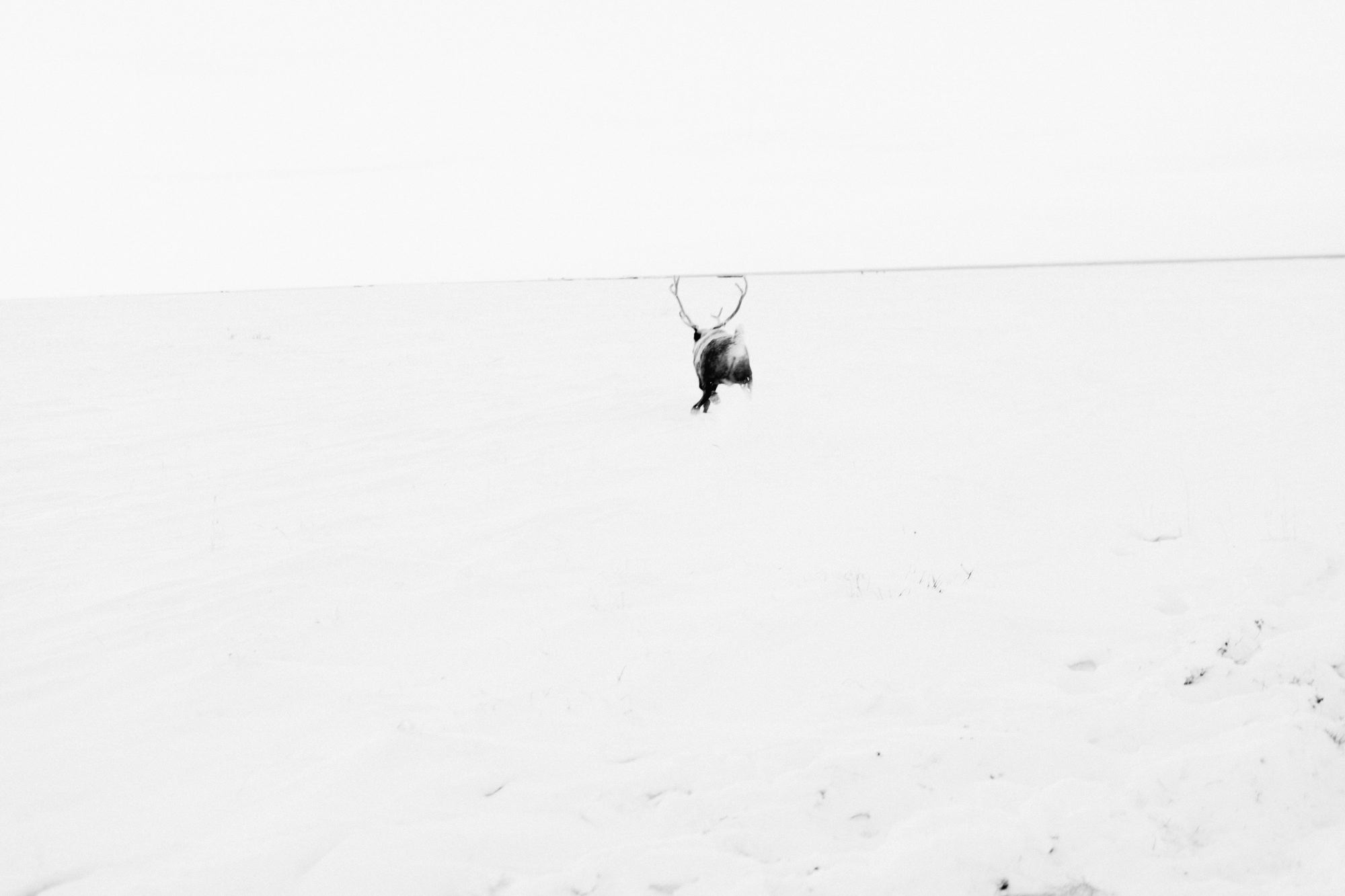
“I have a scrub for my face, because the cold makes my skin very rough. And a toner for the spring, in order to protect my skin from the cold wind. And some Vaseline for the lips. I don’t need anything else.”
“If you came into a pile of money, what would you buy?”
“Equipment for my husband. And food, if there was money left over.”
Neither Zoya nor Robert have ever had a vacation.
“Who would I leave in charge of the deer?” Robert says. “Father did his best to raise them. Now I am doing my best.”
He says he has never been anywhere beyond Salekhard. But Zoya recalls with a smile how a few years ago she went to Vorkuta to shop for food. “I went with other chumwives,” she says. “From the warehouse there we got jam, fruits, cookies, medicine. At least once I saw something other than Panayevsk.”
All three days that I have been living in the chum, Zoya has been working in a long, golden dress. Bright clothing is the only way a woman can embellish herself here. Zoya said that the best gift she could receive would be a length of beautiful fabric. You can’t find it anywhere in the village.
I leave the tundra completely clothed in reindeer skins. It’s four hours just to get to the Trekol, and the first thing I do when I get to the home of Robert’s parents is run to the bathroom. I immerse myself completely in steaming hot water, and it seems like it is the best thing that has happened to me this week since the rose-colored sky and the soft reindeer noses.
Zoya and Robert are in no hurry to wash up, and don’t even take their coats off. They sit side by side on the bed and discuss with their parents the day they will head off on the migration.
“They probably won’t touch us until the new year,” Zoya says. “Most likely they will let us go when we return in the spring. They know that our husbands can’t survive without us, that we won’t abandon our own in the tundra, and that we will continue to be chumwives no matter what.”
Every day we write about the most pressing social problems in our country. Based on our experience, we are certain it is feasible to address and deal with them only by reporting the real state of affairs. This is why our team travels across the regions, takes interviews, talks to people and experts, does photo reportages to sportlight and document people’s lives and stories. We collect money for charity organisations without any commission on our part.
Our media exists due to donations. We hope you can consider subscribing for a monthly donation to support our project. Any help is valuable, especially if it is set on a regular basis. Any sum from you is an opportunity for us to plan our work.
Please, sign up to donate and sustain our media and cause.
Donate